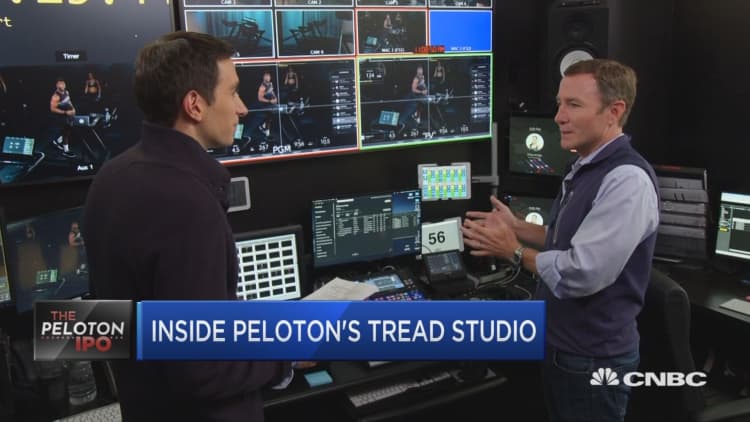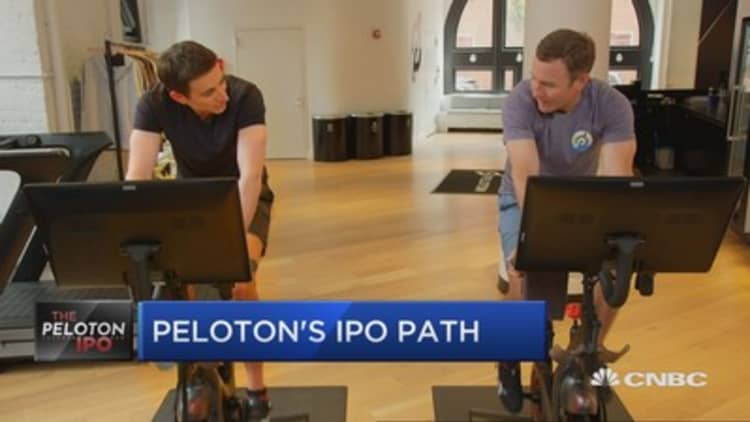
Peloton Interactive CEO and co-founder John Foley told CNBC he sees his at-home fitness company as more than a maker of high-end stationary bikes and treadmills.
Foley brought "Squawk Box" co-host Andrew Ross Sorkin into Peloton's livestreaming control room at Tread Studio in New York ahead of its stock market debut.
Peloton, which debuts Thursday on the Nasdaq under the ticker PTON, priced its initial public offering at $29 per share, the top of its original range of $26 to $29.
"To the extent that we stream close to 1,000 hours of live television programming around the world every month, it's hard not to say we're a media company as well," Foley said in an interview that aired on IPO day. "I mean, this is original programming. We have thousands of classes on demand and we have almost 1,000 live classes every month."
Peloton's bikes and treadmills and accompanying livestreaming and on-demand classes has earned it a loyal crop of users.
However, in the run-up to its IPO, questions have been raised about its long-term outlook as investors seek to understand its core business and path to profitability.
In the fiscal year ended June 30, Peloton reported that sales grew 110% to $915 million from $435 million in fiscal 2018. But its 2019 net loss widened to $245.7 million, from a net loss of $47.9 million the prior year.
In its S-1 initial public offering filing, Peloton said it is an "innovation company at the nexus of fitness, technology, and media."
Critics, such as CNBC contributor and trader Pete Najarian, take a skeptical view.
"When they try to tell us they're a media company and not an exercise company, that tells me a lot," he said Wednesday on "Fast Money." He likened Peloton to Uber, which claims it's a tech platform not a transportation company.
But from early on, Peloton's mission was to be more than just a bike maker or fitness-class provider, Foley told Sorkin.
The founders initially wanted to develop fitness software, but upon surveying the hardware landscape, they determined it was a "dog's breakfast of uninspired" equipment, Foley said. "We decided we had to build the hardware."
After talking with other companies about partnering on the fitness classes, Foley said Peloton determined it could "build more integrated experiences if we controlled the entire technology stack."
Peloton is facing another headwind: a multimillion-dollar lawsuit from music publishers who allege it used more than 1,000 songs from popular artists such as Lady Gaga and Drake without permission.

The company also has faced criticism over the price of its equipment and classes. Its cycles cost nearly $2,000 and treadmills are $4,000. A full membership is $39 per month, and a monthly digital option costs $19.49.
"Our wish is to get the price down and, in the coming years, we want to make sure tens of millions of people around the globe are able to afford a Peloton bike and Peloton [treadmill]," Foley said, while riding a Peloton bike next to Sorkin.
Foley noted that, through financing, someone could buy a Peloton cycle for $58 per month. "And we're not going to rest there," he said.
On the subject of valuation, Foley said that "for better or worse, the investors are going to have to sharpen their own pencil and figure out how to value us on their own."
"Peloton is such a unique business," he said. "There hasn't been any real good metaphors, so we're kind of a category of one."
Investors include Kleiner Perkins, L Catterton and NBCUniversal.
Peloton made it onto CNBC's the past two years.
Disclosure: CNBC parent Comcast-NBCUniversal is an investor in Peloton.


